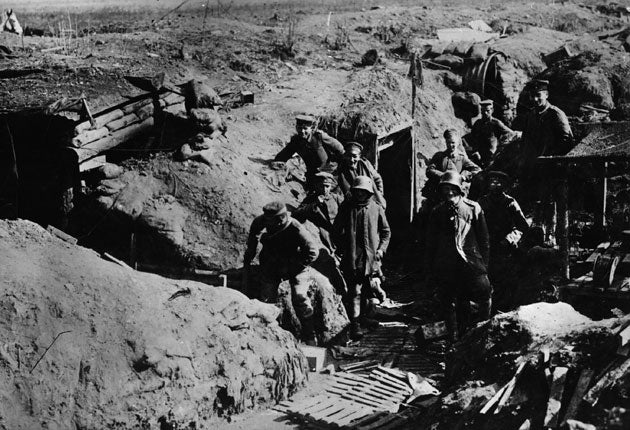The constant gardener takes leave of war dead
After a life tending 500,000 Somme graves, Jean Moody is retiring. He tells John Lichfield why his work must go on

Your support helps us to tell the story
From reproductive rights to climate change to Big Tech, The Independent is on the ground when the story is developing. Whether it's investigating the financials of Elon Musk's pro-Trump PAC or producing our latest documentary, 'The A Word', which shines a light on the American women fighting for reproductive rights, we know how important it is to parse out the facts from the messaging.
At such a critical moment in US history, we need reporters on the ground. Your donation allows us to keep sending journalists to speak to both sides of the story.
The Independent is trusted by Americans across the entire political spectrum. And unlike many other quality news outlets, we choose not to lock Americans out of our reporting and analysis with paywalls. We believe quality journalism should be available to everyone, paid for by those who can afford it.
Your support makes all the difference.The 95th anniversary of the Battle of the Somme this weekend is also a poignant personal milestone for an extraordinary ordinary man.
Jean, or "John", Moody, 64, is the head gardener of what amounts to 3,000 English country gardens scattered across France, an archipelago of military cemeteries left by two world wars. He is retiring this weekend after almost half a century in which he has worked on Commonwealth war cemeteries in more than 40 countries on three continents.
Mr Moody joined the War Graves Commission as a pupil gardener in 1963. He is retiring as horticultural manager of all Commonwealth War Graves Commission (CWGC) cemeteries in France, which include almost 100 miles of flower beds and 500 acres of lawns surrounding 500,000 gravestones.
Mr Moody's father worked as a gardener in France for the CWGC before him. His son David still does. So does his brother, James.
"I learned to walk on the lawns between the graves in war cemeteries. So did my children," Mr Moody told The Independent. "The cemeteries have been my whole life. My great luck was to have worked at something that was my passion. Not many people can say that."
Mr Moody, who has been made an MBE as well as winning horticultural medals in Britain and France, was talking at the Serre Road No 2 cemetery, the largest of the 300 Commonwealth military cemeteries in the département of the Somme. The cemetery, built in the 1920s, occupies a 200-metre stretch of what was No Man's Land between British and German trenches at the start of battle of the Somme (1 July to 25 November 1916).
More than 3,700 British soldiers died in this part of the line on the first day of the battle alone. More than 20,000 were killed that day – the highest number of battle casualties in a single day in British military history.
The Serre Road No 2 cemetery contains 7,139 graves. It also contains more than 3,000 rose bushes, in a magnificent array of red, pink and yellow, and more than 20,000 alpines, or typical English country garden perennials (three for each gravestone).
"The effect is supposed to be that you are walking into a cemetery, yes, and you are entering a sea of gravestones," said Mr Moody. "But also that you are walking into an English garden with typical English cottage garden flowers and lawns with immaculate stripes.
"I always insisted on stripes. To me, there is nothing more beautiful than dark-green-striped lawns against the white of the gravestones."
After starting his CWGC career in France, Mr Moody moved to take charge of most of the British war cemeteries in Germany in 1974 and then in Italy in 1983. From 1992, he was based at CWGC headquarters at Maidenhead in Berkshire. This period included a 10-year spell as head of "Out Area West", travelling to overseas war cemeteries in 40 countries from Libya to Turkey to East Africa. Here, the war cemeteries stick close to the original pattern, but with cactuses and other drought-resistant local plants instead of roses and British perennials.
Mr Moody returned as deputy and then head horticultural manager in France in 2005. He will live in retirement, with his French-Polish wife Dorothée, a few miles from the Somme battlefield.
How will he occupy his time? "I suppose I will have to start putting my own garden straight," he said. "You know what they say about cobbler's children having no shoes..."
Dorothée Moody, who also toured the world in the service of the CWGC, said: "What he will do now, I've no idea, But he won't be able to keep away from his boys lying here, I know that.
"He hasn't been married to me all these years. He has been married to his cemeteries."
Subscribe to Independent Premium to bookmark this article
Want to bookmark your favourite articles and stories to read or reference later? Start your Independent Premium subscription today.
Join our commenting forum
Join thought-provoking conversations, follow other Independent readers and see their replies
Comments